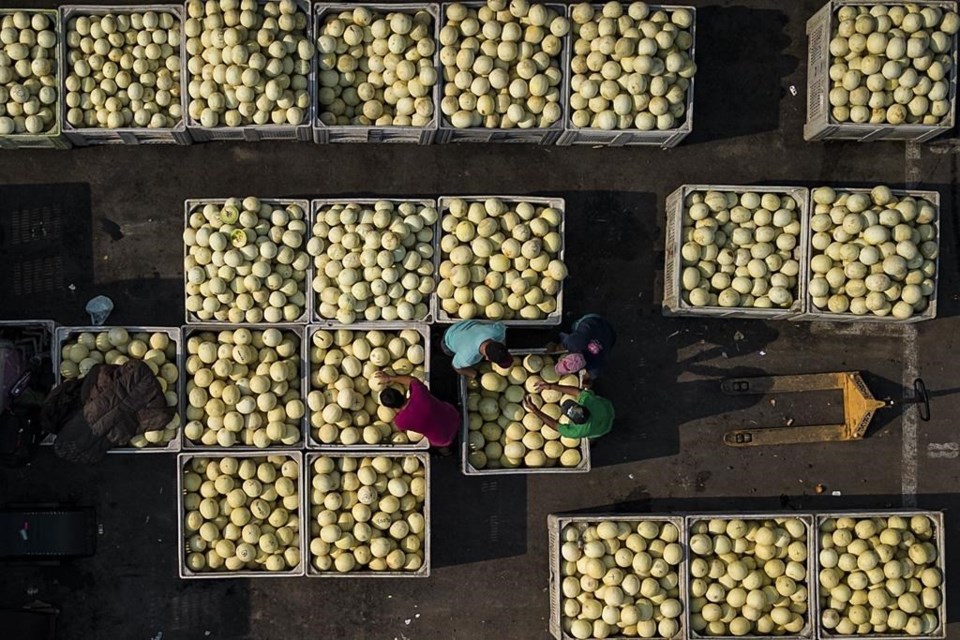Several people are believed to have fallen ill from salmonella-contaminated cantaloupes, the Canadian Food Inspection Agency said Friday.
Since Nov. 1, the food inspection agency has issued recalls for Malichita, Save on Foods and Urban Fare cantaloupe products — including not only whole melons but pre-cut chunks, fruit salads and platters containing the fruit.
The affected products were sold at grocery stores, hotels and restaurants, the agency said.
The reported illnesses were linked to the Malichita cantaloupes, it said Friday in an updated food recall warning, detailing further by email that the affected Save on Foods and Urban Fare products were made using Malichita cantaloupes.
The BC Centre for Disease Control's website listed eight confirmed cases in British Columbia as of Wednesday, while Public Health Ontario said that at least one case had been identified in that province as of Friday.
"The outbreak investigation is still ongoing, so cases may continue to be confirmed," Public Health Ontario said by email.
Another eight cases of salmonella were suspected of being linked to recalled cantaloupes in Quebec, the health ministry there said by email Friday.
Earlier this month, Groupe Tomapure and Fruit Pure brand cantaloupe products were recalled due to salmonella after having been distributed to hotels, restaurants and institutions in Ontario and Quebec.
The affected Malichita cantaloupes were sold between Oct. 11 and Nov. 14, inclusive, the Canadian Food Inspection Agency's Friday notice said.
It said the affected Save on Foods and Urban Fare products had best-before dates up to and including Nov. 9 and were recalled "at the retail level" earlier in the month.
The Malichita cantaloupes were sold in British Columbia, Alberta, Manitoba, Ontario, Quebec, Nova Scotia, New Brunswick, Prince Edward Island and Newfoundland and Labrador and "possibly other provinces and territories," the food inspection agency said.
The Save on Foods and Urban Fare products were sold in British Columbia, Alberta, Saskatchewan, Manitoba and Yukon, it said.
Consumers should throw out any affected products, the food inspection agency said, noting food contaminated with salmonella "may not look or smell spoiled but can still make people sick."
"If you think you became sick from consuming a recalled product, contact your health-care provider," it said.
Symptoms usually start between six and 72 hours after exposure. They can include chills, fever, vomiting, diarrhea, stomach cramps and a sudden headache.
Most people recover on their own within a week, but some may get more seriously ill and require hospitalization.
Young children, seniors and people with weakened immune systems are at higher risk of serious illness from salmonella.
There have been five major salmonella outbreaks in cantaloupes in Canada and the United States over "the last decade or so," said Lawrence Goodridge, professor of food safety at the University of Guelph.
"The cantaloupe can become contaminated when the melons come in contact with manure or soil or compost or water that contains salmonella" while it's growing, Goodridge said, adding contamination often stems from animals and birds defecating on the field.
It can also happen while the cantaloupes are being processed, he said. Although they are usually washed in chlorinated water, the rough texture of the skin can make it "difficult" to clean the bacteria in the crevices.
Salmonella on the surface gets inside the cantaloupe when it's cut, Goodridge said.
"The flesh is a very good place for bacteria to grow because there's lots of water, there's lots of nutrients and the pH is around neutral," he said.
It's possible to become infected from handling the outside of the cantaloupe if there's a high concentration of salmonella on the skin and the person then touches their mouth or other raw food, he said, but most salmonella illnesses are caused by eating the cantaloupe itself.
Although people should throw out the cantaloupes affected by the current recall, Goodridge noted they can also take steps to reduce their risk of salmonella from eating cantaloupe in general.
The melons should be washed under running tap water while the thick outer skin is scrubbed with a brush, he said.
If the cantaloupe is too heavy to hold with one hand while scrubbing with the other, people can put it in a colander and brush any dirt off, then pour boiling water over it, he said.
Cantaloupe should also be kept in the fridge to prevent bacteria growth, Goodridge said.
This report by The Canadian Press was first published Nov. 17, 2023.
Canadian Press health coverage receives support through a partnership with the Canadian Medical Association. CP is solely responsible for this content.
Nicole Ireland, The Canadian Press
Note to readers: This is a corrected story. A previous version erroneously reported that the affected Save on Foods and Urban Fare cantaloupe products were sold up to Nov. 9. In fact, the affected products have best before dates up to and including Nov. 9.



